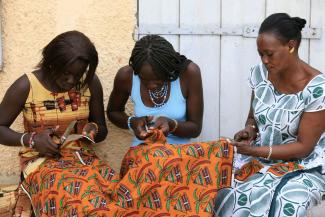Informal work
Better education and training

Around 2 billion people in the world work in the informal economy. That is more than 61 % of the world’s economically active population. In South Asia and sub-Saharan Africa, the informal employment ratio is well above 80 %. In the industrialised world it is only around 18 %.
Marginalised groups and people with little education often cannot find formal jobs. In many cases, informal work is the only option they have for earning a living. The informal economy thus secures livelihoods and a future to those who have no access to formal employment. Moreover, to many teenagers and young adults with no formal educational or vocational qualifications, informal employment is the only opportunity to acquire work experience and skills.
The problem is that the informal economy is fraught with problems – both at the individual and societal levels. For various reasons, informal workers are particularly at risk of poverty. Because of educational shortcomings and insufficient access to capital, informal businesses’ productivity tends to be low. Accordingly, incomes tend to be lower and less secure than in the formal sector. Moreover, informal workers are much more exposed to impacts of illnesses or disability. Their employers provide no social protection.
At the same time, the informal economy deprives the state of tax revenues it urgently needs to fund public services. That is especially serious in developing countries and emerging markets. In the informal sector, moreover, the scope for state control and regulation is small. All too often, international labour standards (“decent work”) are not observed (see Focus section on “Informal and formal employment” in E+Z/D+C e-Paper 2017/10).
Globally speaking, there are more men than women in informal employment, but the opposite is true in developing countries and emerging markets. In sub-Saharan Africa, in particular, women are disproportionately likely to be informally employed – often in exceptionally precarious conditions. They work as domestic workers, for example, or as members of a family that owns a business that they contribute to. An important reason is that cultural norms tend to restrict women’s freedom to work in many places. Unequal access to education and training also matters, of course.
From informal to formal work
Education and training are crucial factors in facilitating the transition from informal to formal employment. The higher a person’s level of education, the less likely that person is to be informally employed. The connection between education and formal employment has been documented by studies in all world regions. More than 90 % of all adults in the world with no formal education work on an informal basis. Among those who have graduated from secondary schools, the figure is only around 50 %.
Better occupational skills boost productivity in informal businesses, facilitating higher-quality products and services. Vocational training can thus help pave the way to formalising a company. On the other hand, jobseekers who have acquired formal vocational qualifications have proved their proficiency and are thus more attractive to formal employers. Beyond that, additional opportunities of further training and education are likely to open up, when trainees attain formal qualifications.
To reach informal workers, the public vocational-training system needs to ensure access. Training centres and vocational schools often have high enrolment barriers, including course fees and educational requirements.
Indirect costs are another challenge. Informal workers generally cannot afford to forgo their incomes, so they cannot participate in full-time training. If they are to benefit from what training institutes and educational establishments offer, these institutions must not only provide easier access. They must also tailor programmes to the needs of the informal sector. One option is to set up short-term or evening courses that can be attended after work and that cater to the educational level and to the qualifications required by the target group.
Flexible, non-formal training programmes have poverty-reducing potential. This is especially true for women, who often must do household chores on top of contributing to the family income.
Another way to make vocational training more inclusive is to upgrade existing apprenticeships. A traditional apprenticeship is a socially recognised and culturally established form of training in small informal enterprises. Apprentices work alongside experienced skilled workers and are thus taught the basics of the respective trade or occupation.
This type of training is widespread and sometimes even more relevant than the public vocational-training system. This is the case in many sub-Saharan countries. For youngsters from disadvantaged backgrounds, in particular, apprenticeships offer access to training and employment. A cost-effective and efficient opportunity to improve employability is to promote and formally recognise traditional training systems of this kind. To help gear apprenticeships more effectively to modern requirements, it can be useful to link on-the-job training to class-room lessons in vocational schools.
For apprentices, such link-ups with government-run vocational training institutions has an additional advantage: formal certification becomes feasible. The systematic provision of further training to those who instruct apprentices in informal businesses will also contribute to raising standards. Wherever possible, efforts to improve apprenticeships should be made in cooperation with local groups and associations that exist in the informal economy. Moreover, care should be taken to ensure equal access, regardless of gender to ensure that women can benefit from traditional apprenticeships too.
Opportunities for informal workers can also be improved by formally recognising and certifying informally acquired occupational skills. People working in the informal economy generally have lots of experience-based knowledge and practical skills. To make them more visible, it makes sense to verify and testify them. That will not only boost people’s self-esteem, but also enhance their job-market opportunities.
Fabian Jacobs worked on the GIZ “Toolkit – Learning and working in the informal economy”, which provides an overview of vocational training in the informal economy. In addition to background information, the toolkit presents tried and tested approaches from practice.
fabian-jacobs@hotmail.de












